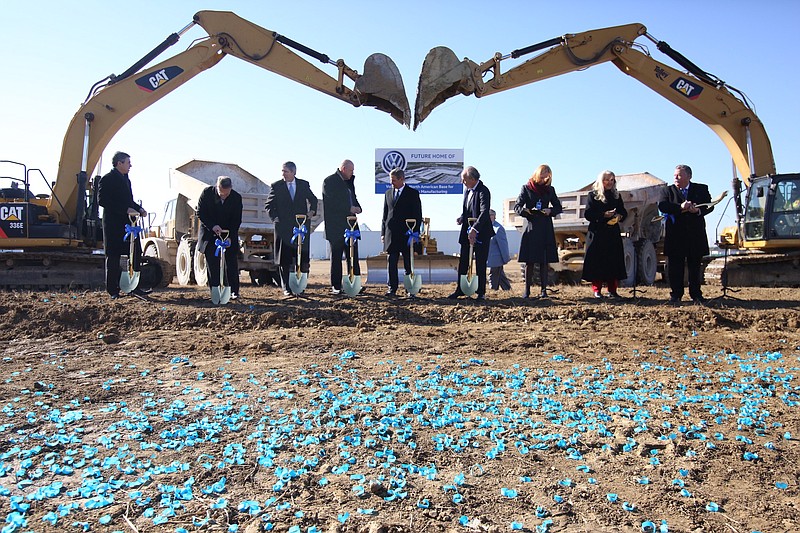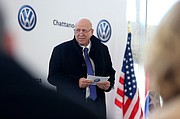Chattanooga was called the base for Volkswagen's electric vehicle operations in North America on Wednesday as work started on an $800 million plant expansion to make a battery-powered SUV.
"This is a really bold move," said Tom du Plessis, Volkswagen Chattanooga's chief executive. "It's a new exciting journey."
On a site near where VW once stored hundreds of cars temporarily decommissioned due to the diesel emission scandal, the automaker plans to add more than 750,000 square feet to its Chattanooga facilities to produce the more environmentally agreeable EVs.
The expansion includes a 564,000-square-foot addition to the body shop where Volkswagen will build both internal combustion engine vehicles and EVs on the same assembly line.
BY THE NUMBERS
* More than 100,000 — Electric vehicles the plant can make after expansion* 564,000 square feet — Size of the body shop expansion* 198,000 square feet — Size of new battery pack assembly facilitySource: Volkswagen
Also, the company plans to build a 198,000-square-foot facility adjacent to its factory for the assembly of battery packs for battery-powered vehicles.
Emily Haber, Germany's ambassador to the United States, said EVs are "a new generation of vehicles that have the power to revolutionize the industry."
She said VW's investment comes at a critical time when businesses are facing uncertainty due to tariffs and other issues.
"German carmakers believe in the U.S. market. They believe in Tennessee," she told several hundred people at the plant site.
Volkswagen is sourcing the batteries from SK Innovation, a South Korean company that is building a $1.67 billion factory in Northeast Georgia. At VW's new facility, the automaker will put together the battery packs that will be installed beneath the electric SUV.
When production of the all-electric SUV begins in early 2022, officials said, the Chattanooga plant will have capacity to assemble more than 100,000 EVs annually.
The company plans to add 1,000 more employees to its 3,800-person workforce. Hiring for the new assembly work will begin in early 2020 and continue as needed for ramping up production, according to VW.
Tennessee Gov. Bill Lee pledged to help the state produce skilled workers for such jobs and to attract more global companies such as Volkswagen.
"I come from a background of skilled tradespeople," said the former businessman, adding that he recognizes how valuable those employees can be to companies. "One of the greatest things we can do is develop this workforce."
David Geanacopoulos, Volkswagen Group of America's senior executive vice president for public affairs and public policy, said about 1 million vehicles have been assembled in Chattanooga since production began here in 2011.
He said the compact electric SUV, which will be about the size of the existing Tiguan and dubbed the ID. Crozz, will join the Passat sedan and Atlas and Atlas Cross Sport SUVs on the plant's assembly lines. The ID. Crozz will be made in Germany for a couple of years before production begins in Chattanooga.
In addition, citing VW's environment stewardship, Geanacopoulos said the company is working with the Conservation Fund to expand the nearby Cherokee National Forest by 1,500 acres.
Chattanooga Mayor Andy Berke said Wednesday was another moment "when we see products of the future coming to Chattanooga."
"The impact of this vehicle will continue for generations," he said.
Hamilton County Mayor Jim Coppinger added that an immediate impact to the economy will come from the workforce that builds the expansion.
"It will take 17 months to do," he said. "They'll spend a lot of money in our economy."
Coppinger also said VW last year put $4 million in taxes into the public schools and it has invested $1 million in so-called eLabs, which permit students to gain access to technologies such as automated manufacturing, 3D printers and robotics.
Scott Keogh, president and CEO of Volkswagen Group of America, said in a statement that Wednesday was "a big, big moment for this company. Expanding local production sets the foundation for our sustainable growth in the U.S. Electric vehicles are the future of mobility and Volkswagen will build them for millions, not just millionaires."
Local positions added for the expansion include supervisors, specialists and a variety of engineers specializing in electrical, software, mechanical, manufacturing, chemical and quality, according to VW.
"Electric vehicle and electric-vehicle battery production require new and different technical skills than those we currently use," du Plessis said.
Four years ago, the federal government said VW was in violation of the Clean Air Act after it had used so-called defeat devices in its diesel vehicles to cheat on pollution tests. VW agreed to buy back nearly 380,000 of the cars in the U.S. in order to fix or scrap them and it stored them in locations around the country, including at the Chattanooga plant site.
Contact Mike Pare at mpare@timesfreepress.com or 423-757-6318. Follow him on Twitter @MikePareTFP.

